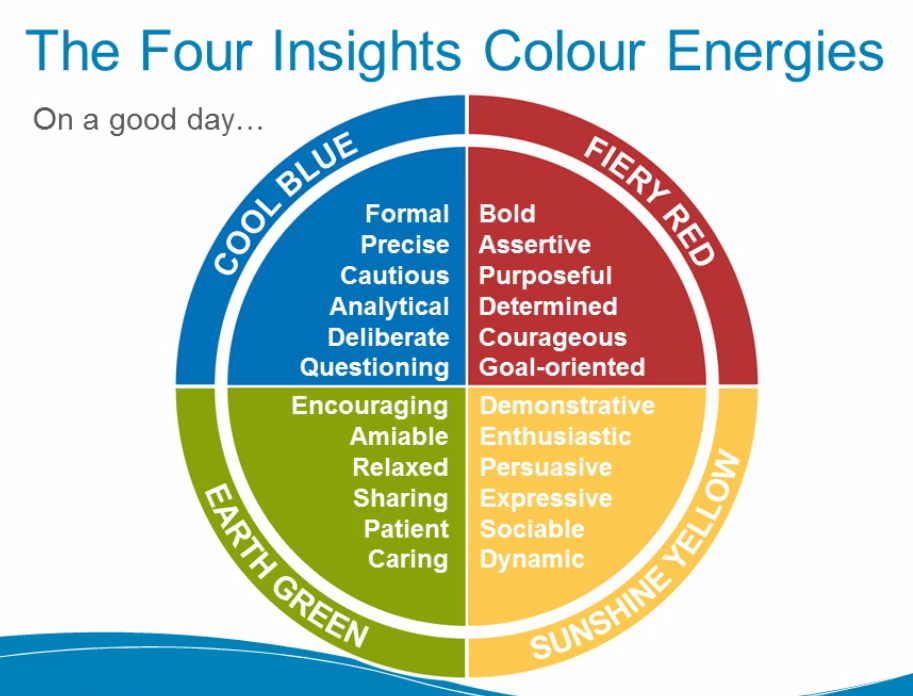Most are made up and silly.
The only one I’ve liked was in college I did a “communication style” one. Where it showed a bunch of different like emails, posts, and conversations and asked which you preferred to receive and which you were likely to write.

10 years later I still think about it, cause the goal of the work was to talk about how if you’re a certain communication style what to keep in mind with communicating with others. Like tips to not get frustrated with yellows who don’t care about facts when sending emails and how to write emails that don’t bore and frustrate people if you’re blue. (I’m blue green. I can sometimes write long emails)
I thought about it the other day cause a guy was complaining about all these emails that didn’t seem to say anything, they were just about feeling good, and he just wanted them to spit it out. Which corresponded to firey red getting mad at green.
So with that context, do you have any that actually had an impact on you?
The love language test in part because it was a great way to start a conversation about our romantic needs with my spouse.
Oh that makes a ton of sense!
Even if the categories are iffy, both people getting different results is probably enough to go “hey maybe we need to talk about what makes us feel loved”
I enjoy the D&D alignment chart.
It’s not like that’s a worse metric than MBTI
I should’ve just said my result is “Chaotic Good” at that corporation “team-building” personality test workshop
Most typological approaches to personality are BS. Take Meyers Briggs as an example. If you are 51% extroverted, you are an extrovert, supposedly having more in common with someone who scored 100% on that same metric than an “introvert” who scored 49% on that metric.
I don’t think Meyers Briggs claims that magnitude is irrelevant. Most tests I’ve done will tell you a score on each of the four axes.
MBTI most definitely takes magnitude into account. It’s bullshit for many other reasons, including not being reliably measurable.
Is anything in psychology reliably measurable?
Yes, very much so, many many things.
Well yes they are.
That’s why I was asking if any stood out to you as helpful.
Yeah I didn’t have an answer but wanted to contribute to the conversation lol
I must be pretty solidly into my categories on MB as while I agree it is BS, it was also alarmingly accurate for me.
Ya not a fan of those ones, they need more room for public vs private introversion like I’d sooner walk on a stage naked and introduce myself than to try and mingle at a party
The ones for autism :•|
The one that confirmed I should talk to a psychiatrist about a possible ADHD diagnosis.
I’ve heard the love language test is pretty decent
MBTI is astrology for people who think they’re too smart for astrology
MBTI is astrology for people who think they’re too smart for astrology
I don’t understand this take. A system that extrapolates your personality from the movement of the stars, and a system that summarizes your personality from answers to a questionnaire about your personality, are fundamentally different approaches to personality categorization.
Edit: Astrology is prescriptive; you are categorized as this thing so you are expected to act in such a way. MBTI is descriptive; you act in such way so you are categorized as this thing. Whether or not you think those categories are accurate or significant, there is a fundamental difference between putting a label on a collection of traits, and declaring a correspondence between some separate factor and a collection of traits.
I think their point is both don’t stand up to rigorous scientific scrutiny.
The gold standard in personality tests is the NEO PI-R.
I’d recommend the book Me Myself and Us by Dr. Brian Little. Or even just search YouTube for lectures he’s given.
All personallity tests are idiotic and unscientific.
Removed by mod
So they’re helpful but they don’t work?
Most personality tests will not tell you anything about yourself that you didn’t already know, it will not give you any insights into the correct way to live your life or what is going to work for you.
However, it can help you frame things about yourself in a new light or to help you come to understand the way that you work inside of a larger social picture.
So they don’t work to tell you who you are, but they help you be who you can be.
Removed by mod
That is just understanding the different types of personalities, personallity tests claim to detect what type of a personallity a person has, quite different.
The former is very useful, the latter is just plain crap
Removed by mod
Official Hogwarts House Sorting Quiz
Nope, they are all made up recruiting companies to try and justify their ridiculous fees.
Requiring personality tests is just admitting that you are socially incompetent.
Big 5 personality test
BIG. FIVE.
it’s the only one not named after anyone because it wasn’t just ONE person or duo who came up with it.
IT’S THE ONLY ONE SUPPORTED BY >100 INDEPENDENT STUDIES. All caps here bc it’s kinda important that these things be more than just one researcher reinventing astrology*
*COUGH meyers briggs pile of bullshit COUGH
The Big 5 is the only “personality” test used in actual scientific studies, if I recall correctly.
Probably an attachment style test. Attachment theory is empirically valid, and knowing your attachment style can help you understand relationship patterns: communication, behaviors, emotional needs, etc.
After that, the love languages are a good start to a conversation. Essentially they can help you figure out how you prefer to be cared for, and how you tend to show that you care. The categories themselves are arbitrary, and they’re based on observations by a baptist minister who offered relationship counseling. He’s not a licensed mental health professional, and the love languages aren’t empirically based. One issue I have with his book is that he claims that men tend to have “physical touch” as their love language, and that women should have more sex with their husbands to help them feel loved.
The Big Five personality traits are the most valid of the popular personality tests, but I didn’t feel like they helped me understand myself more.
I really got a lot out of the Myres Briggs when I was younger. I know its not scientifically valid, and it’s stupid of folks take it too seriously, but it really helped young me understand that other people weren’t wrong/dumb/weird for approaching things differently. And it helped me understand some of the axis on which difference can lie in a helpful way.
I think in the post internet age people are very aware of different categories and identities, but growing up in the previous millenium it wasn’t something that we talked about much. The introvert / extrovert division is overblown and overly simplistic nowadays, but before people use to just criticise each other for being “too shy” or “too loud” like there was a “normal” way to be that everyone should get.
The big five is certainly more reliable and scientifically supported, but I never found that it helped me understand a coworker or friend better. Partly I think conscientiousness and neuroticism sound a little too value laden. People can happily self describe as “detail orientated” (Sensing) or “big picture types” (Intuitive) but nobody really wants to say “I’m closed-off and unconscientious”. And I think that’s why MB has been popular in business / organisation worlds, because it’s a useful way to get people discussing themselves and how they approach problems. It doesn’t matter that in reality my level of extraversion varies depending on the context, or I’m Judging in certain tasks but Perceiving in others.
I used to have a job that was really into the Core Value Index. I thought it was pretty awesome because their categories were really simple and there are only 4 so you can really wrap your head around the whole thing at once.
It’s not a full personality test, it’s more focused on trying to answer the question “How do you want ideas presented to you?” And. “How do you prefer to interpret ideas?” I found myself making meanful changes in how I worked with coworkers where I knew their results, which isn’t something anyone can manage with more complicated tests.
I have done many.
“Helpful” needs to be defined. In my younger life it helped me to find out about my personality. Later it also helped to understand other people.
Sometimes these tests gave contradicting results, so I learned that these results can never be taken 100% literally. You have to decide what to take from it and what to leave.
MBTI was the first one that fully admitted this, and that book even explained how these things change when you get older. So I consider this the most helpful one.
The strongest one IMHO was the Enneagram. But also most hard to understand.
The most scary one (and in retrospect, the most funny one) was at Scientology. It helped me to understand what a bunch that is and how they can catch people.









